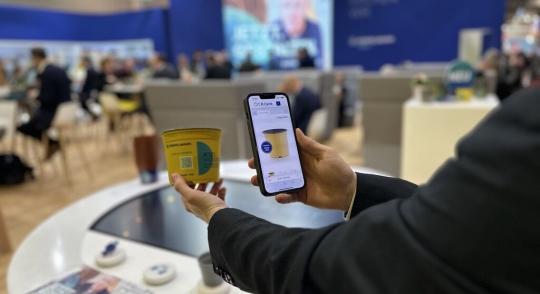

How data increase the recyclability of food packaging
To create real added value by extending the life cycle of packaging, recycling packaging will need to be as easy and efficient as possible in the future. Information that is collected in a digital product passport during production and then retrieved using digital watermarks is an essential ingredient in making a circular economy a reality. R‑Cycle provides an open and globally applicable standard for this automated data transfer process.
R-Cycle and Greiner Packaging can deliver:
- Smart packaging
- Traceability along the value chain
- Improved precision for waste sorting
- Better quality recycled materials
- Higher recycling rates
Taking sortability to the next level
Though there have been extensive efforts to make packaging sustainable in recent years, even fully recyclable plastic packaging is still far from the circular economy ideal. Only a small amount actually goes on to be processed into high-quality recycled material. This issue stems in part from the strict requirements placed on food-grade recycling materials – plastics that come into contact with food are subject to highly specific criteria. Recycled food packaging can only be made from recycled material sourced solely from food packaging. In the waste sorting process, however, it is currently not possible to identify and source-separate recyclable food packaging. In general, the inferior purity of the sorted grades makes it difficult or impossible to use the resulting recycled material in high-quality plastic products. If a true circular economy is to be established for plastic packaging, it will require a traceability standard for plastic packaging that involves recording all the information from the production process relevant to recycling and making it available for the sorting process.
Data management: pilot project with R-Cycle
In the future, when used packaging that is traceable via R-Cycle is collected and ends up in a sorting facility, a high-resolution camera on the sorting belt will be able to identify it accurately. Depending on the attributes communicated by the watermark, the packaging can then be automatically directed to the right sorting stream. But this will require corresponding adjustments to the technology at sorting facilities, including a comprehensive underlying database populated with the necessary information that the sorting system can access quickly and easily. “At Greiner Packaging, we are working on this with the specialists from R-Cycle as part of a pilot project,” explains Florian Aschermayer, global senior circular economy project manager at Greiner Packaging. As a cross-industry consortium, R-Cycle is developing an open and globally applicable traceability standard that will ensure seamless documentation of recyclable packaging along the value chain, stored on a common data platform. This can be connected to any production system, from film/sheet lines and injection molding machines through converting, printing, and filling machines to waste sorting systems.
"At R-Cycle, we are creating one of the essential building blocks for high-quality plastics recycling, enabling the entire value chain to be traced all the way back to the raw materials used via a cloud-based database. Traceability is the key to success.”
Dr. Benedikt Brenken, Director of the R-Cycle initiative
Digital watermarks link packaging with packaging information
R-Cycle is open to a range of different marking technologies. In the case of packaging for consumer goods, digital watermarks come into play. These codes, which are invisible and duplicated across the entire surface of the packaging, can be linked to the R-Cycle data. This will then contain all the relevant information: the manufacturer, the types of plastic contained, the composition of multilayer packaging solutions, and details regarding the packaging product’s use in food or nonfood markets. In this way, waste sorting systems with the appropriate detection technologies will be able to identify fully recyclable packaging, laying the foundation for obtaining high-quality materials for a truly effective recycling system.
Testing initial prototypes
The packaging specialists at Greiner Packaging and elsewhere are currently developing the first digital watermarks incorporated within packaging decoration and linked with R-Cycle. Digital watermarks can be integrated into various types of decoration, and the information can be amended at any time without needing to change the packaging design itself.
“We are currently testing initial prototypes as part of a flagship project in close partnership with digital watermark specialists Digimarc. In particular, efforts are focused on making adjustments to the decorative artwork to ensure that the digital watermarks are placed on the packaging as discreetly as possible without affecting the packaging design.
Florian AschermayerGlobal Senior Project Manager Circular Economy at Greiner Packaging
Together against plastic waste
As a proud partner of the HolyGrail 2.0 initiative, led by the European Brands Association (AIM) and supported by the Alliance to End Plastic Waste, Greiner Packaging is helping to accelerate the implementation of digital watermarks on packaging, along with more than 130 companies and organizations from the entire length of the packaging value chain. As part of the initiative, brand manufacturers are working with retailers, converters, systems suppliers, and recycling companies to launch activities along the whole value chain with the aim of testing out the feasibility of digital watermarking technologies and demonstrating their potential.
But as well as communicating packaging information, the watermarks also have the potential to be used in other areas, whether to promote consumer engagement, demonstrate transparency in supply chains, or run retail promotions.
Digital product passports: driving the circular economy
The digital product passport is intended to promote a circular economy within the EU. One of 70 practical measures on the Digital Agenda, the passport will contain information about a product’s components, materials, and chemical substances as well as repairability, spare parts, and how to dispose of it properly. This also allows environment-related data to be aggregated in a consistent format, making it easier for other parties in the value and supply chains to work toward a circular economy. Plus, the passport will help customers make sustainable consumer choices. With the digital product passport R‑Cycle is developing for plastic packaging applications, it already comprehensively meets the EU requirements and has the technical capabilities to put them into practice. In an automated process, all the information from the value chain will be transparently provided for every process participant to use. This is set to increase sustainability and efficiency, both with regard to information sharing and within the plastic packaging production process.
More Success Stories from R-Cycle



